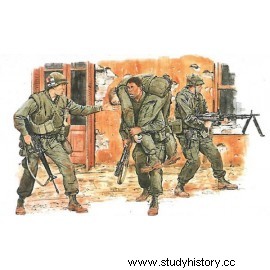
The soldiers themselves were not immune to the contagion. The Chairman of the Combined Joint Chiefs of Staff, General Wheeler, returning from Saigon (where his quarters had been subjected to enemy bombardment), appeared deeply concerned. Westmoreland himself, although he was optimistic about the outcome of the Tet Offensive, believed that the enemy was capable of launching other operations. Wheeler and his colleagues also reaped serious headaches from other problems:the North Koreans had just seized the American signal ship Pueblo; the situation in Berlin and the Middle East threatened to flare up again at any moment; the U.S. Army's strategic reserve had fallen to one division—and the Vietnam War had had deplorable effects on the morale of U.S. forces around the world.
General Wheeler, eager to to replenish the strategic reserve and to be prepared to meet future enemy actions in South Vietnam, urged Westmoreland to demand substantial American reinforcements. Anxious to take advantage of the situation, Westmoreland saw an opportunity to acquire forces that could serve him, if the President allowed him to invade Laos and Cambodia, and launch an amphibious attack to trap the North Vietnamese forces. inside the demilitarized zone. The general perceived, moreover, that the request for reserves would make it clear to the North Vietnamese that the United States would accept no other settlement than victory.
President Johnson did not know what meet this demand for 206,000 additional men—half for South Vietnam, half for the strategic reserve. He demanded two in-depth analyzes of the achievements likely to be made with these reinforcements. The first was given to a committee chaired by the new Secretary of Defense, Clark M. Clifford, the second to a group of ex-servicemen including prominent World War II commanders. Overly impressed, perhaps, by what they had read in the newspapers and seen on television, both groups spoke out against reinforcement.
The President accepted their advice. But before any public announcement, the New York Times revealed that the administration was considering sending 206,000 more troops “to Vietnam.” The press and television reacted in the critical style then usual for almost everything related to the war. The media attributed the president's relatively poor result in the New Hampshire Democratic primary elections a few days later to an anti-war protest by voters. In reality, as what followed would show, the vote was more of a protest against Johnson's inability to take a tougher stance after the Tet Offensive...
In South Vietnam, the events of the months that followed proved that the enemy had been hit hard in the Tet Offensive, as Westmoreland had asserted. The Communists attempted two follow-up attacks—one in May, the other in October with rockets and mortars—but these were stillborn operations. The pacification program, prematurely buried by the press, picked up speed. Government control was quickly restored in the part of the country abandoned during the offensive and even considerably strengthened. Far from being demoralized, the ARVN showed increased abilities and morale:recruits abounded! The Americans set up a program to provide regulars and militiamen with new and better weapons and equipment.
As for the people, for the first time they seemed to show real support for the Saigon government. He was soon able to arm thousands of people and form a nationwide self-defense force. Does a government that fears its people provide them with the weapons that will turn against them?
President Johnson then decided that after four and a half years in Vietnam, General Westmoreland should be promoted to the post of Chief of Staff of the US Army, and that his deputy in Saigon, General Creighton W. Abrams, would be the new US commander in the field. Although Johnson had made the decision in mid-January, before the Tet Offensive, his delayed announcement allowed Westmoreland critics to continue to claim that the President, disappointed with the general during the Tet Offensive, had "promoted on a siding"...
